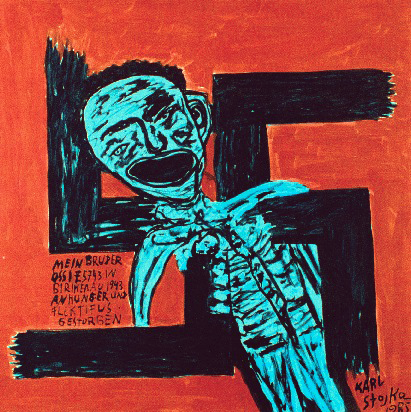
——————————— Silvio Peritore ist Leiter des Bereichs Dokumentation im Dokumentations- und Kulturzentrum Deutscher Sinti und Roma in Heidelberg. Seit 2011 ist er stellvertretender Vorsitzender des Zentralrats Deutscher Sinti und Roma.http://www.youtube.com/watch?v=uI0dLJFXApo ————————————————– „My little Brother Ossi died from hunger. He was in the bed above, seven years old, and we had to go to work and he was alone! And when the others gave him more bread, then the elder ones stole the bread and the tea and the soup from him. And so he starved to death, he died. Where was God?” |
A sad star in the high heavens
they took me from my own house
they brought me to the camp
where they burnt me to ashes.
Shame of a continent
They are the forgotten people, persecuted throughout history, murdered in their hundreds of thousands by the Nazis, seen as second-class citizens in much of eastern Europe. And soon the countries that treat them worst will be our EU partners. Gary Younge investigates the plight of the Roma
http://www.theguardian.com/world/2003/jan/08/eu.politics
„Der Schoß ist fruchtbar noch, aus dem das kroch.“
The womb he crawled from is still going strong (The Resistible Rise of Arturo Ui by Bertold Brecht)
Věra Vysloužilová: Der Holocaust in den Volksliedern der Roma in Mähren
Simon Wiesenthal Conference:
Partituren der Erinnerung. Der Holocaust in der Musik
Scores of Commemoration. The Holocaust in Music.
04.10. – 06.10.1011,
at the University of Music and Performing Arts Vienna.
O the black bird went into my heart and stole it. Here I live in auschtwitz here in auschtwitz I’m hungry, there isn’t a piece of bread to eat. there isn’t nothing to eat here its all my bad luck. at one time I had my home. I’m so hungry I could kill. oh oh Jesus. OH OH.
A scene from the movie Latcho Drom.
Sang by romani holocaust survivor Margita Makulová. Takes place in Slovakia.
Marble Arch, London, 2013
Just a few information and news
Geteilte Verantwortung? Die „Lehren aus Auschwitz“ und die Situation der Sinti und Roma heute.
In meiner 2011 abgeschlossenen Dissertation mit dem Titel „Geteilte Verantwortung? Der nationalsozialistische Völkermord an den Sinti und Roma in der deutschen Erinnerungspolitik und in Ausstellungen zum Holocaust“ habe ich den Entwicklungsprozess der deutschen Sinti und Roma als Teil der deutschen Erinnerungskultur beschrieben, der untrennbar mit der eigenen Bürgerrechtsarbeit einhergeht. Während des Holocaust wurden schätzungsweise bis zu einer halben Million Sinti und Roma im nationalsozialistisch besetzten Europa aus den gleichen rassenpolitischen Motiven und mit den selben Methoden bzw. dem identischen Täterapparat wie die Juden ermordet. Während der Holocaust an den Juden in das breite öffentliche Bewusstsein gerückt ist und die deutsche Politik und Gesellschaft – zumindest in ihren Absichtserklärungen – zurecht eine daraus resultierende historische Verantwortung für die Juden und den Staat Israel ableitet, ist diese Form der Verantwortung – die Lehren aus Auschwitz – im Falle der heute in Europa lebenden ca. 10 Millionen Sinti und Roma nicht oder nur bedingt erkennbar. Ebenso werden Sinti und Roma entgegen der Tatsachen kaum als Staatsbürger ihrer jeweiligen Heimatländer betrachtet und behandelt, sondern ihnen wird besonders in den Staaten Ost- und Südosteuropas die gleichberechtigte gesellschaftliche Teilhabe verweigert oder dieses wird zumindest in Frage gestellt. Dies zeigt sich vorwiegend in Kernbereichen wie Menschenrechte, Bildung, Beschäftigung, Sicherheit, Wohnen und Gesundheitsversorgung. In vielen medialen Darstellungen werden Sinti und Roma als „fremd und anders“, eben nicht dazugehörig, stigmatisiert, und über rechtsextremistische Netzwerke werden sie diffamiert und bedroht, was in den letzten Jahren zu zahlreichen Morden an Roma in Osteuropa durch Neonazis geführt hat. Darauf werde ich in der anschließenden Diskussion näher eingehen.
Silvio Peritore ist Leiter des Bereichs Dokumentation im Dokumentations- und Kulturzentrum Deutscher Sinti und Roma in Heidelberg. Seit 2011 ist er stellvertretender Vorsitzender des Zentralrats Deutscher Sinti und Roma.
Slandering Britain’s Roma isn’t courageous. It’s racist
The arrival of a group of marginalised people is challenging not because of who they are, but because they are poor
Roma Victims of the Holocaust: Roma in Auschwitz
http://www.jewishvirtuallibrary.org/jsource/Holocaust/gypsies.html
Report reveals that Romani women were sterilised against their will in Sweden
Roma, Feared as Kidnappers, See Their Own Children at Risk
Serbia: Skinheads try to abduct fair-skinned child from Romani family
On the Margins- Slovakia . Roma and Public Services in Slovakia
http://www.opensocietyfoundations.org/sites/default/files/slovakia.pdf
Who Do Modern-Day European Nazis Hate the Most?
A recent trial highlights horrible abuse of the Roma minority group.
New Discrimination: A dangerous shift for Hungary’s Roma
http://www.neweasterneurope.eu/node/952
Hungary’s Roma: Living on the edge
http://www.aljazeera.com/indepth/features/2013/08/2013812113150303461.html
The Land of Accidents
http://www.nybooks.com/articles/archives/2001/feb/08/the-land-of-accidents/
Porajmos
http://en.wikipedia.org/wiki/Porajmos
http://de.wikipedia.org/wiki/Porajmos
Genocide of European Roma (Gypsies), 1939–1945
http://www.ushmm.org/wlc/en/article.php?ModuleId=10005219
Gypsies and the Holocaust The Story of Some of the Forgotten Victims of the Holocaust
http://history1900s.about.com/od/holocaust/a/gypsies.htm
The Plight of Czech Gypsies in the Holocaust and Today
http://www.leftcurve.org/lc22webpages/gypsies.html
Karl Stojka
Holocaust (Austrian information)
The persecution of “Gypsies” which had lasted for centuries culminated in genocide under the NS regime. Defined as a “problem”, “asocials” and “racially ninferior”, the Roma were arrested and murdered in the German Reich and in the German-occupied territories.
|
|
| Traurigi čerheni ando učo nebo. Legede man andar mro šatno khere. Ando logeri man legede, odoj tharde man upro praho. |
A sad star in the high heavens
they took me from my own house
they brought me to the camp
where they burnt me to ashes.
http://romafacts.uni-graz.at/index.php/history/persecution-internment-genocide-holocaust/holocaust
